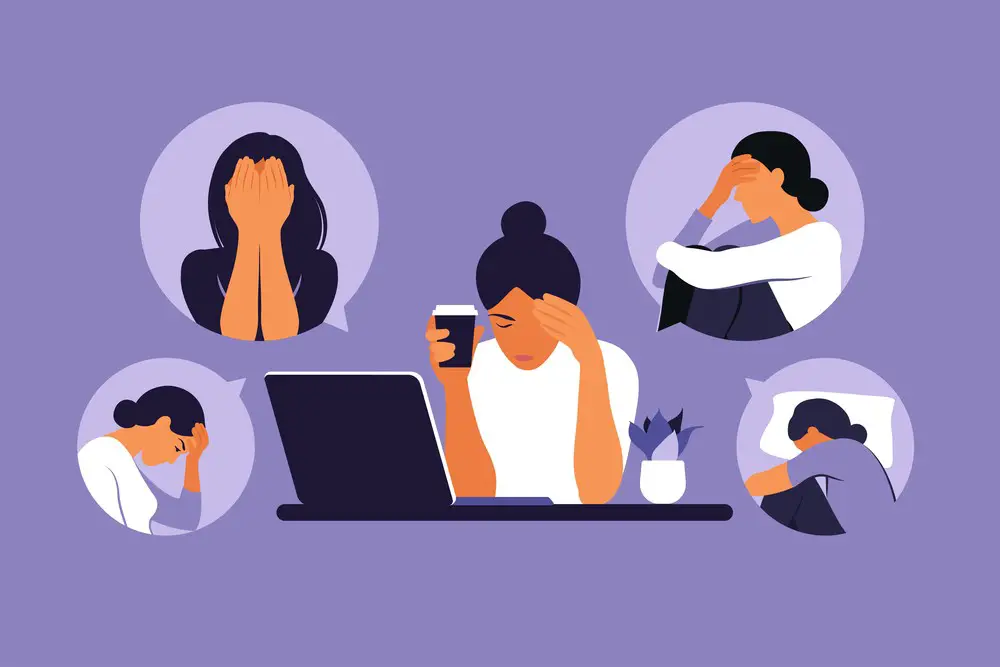Nobody is immune to stress, which most of us experience daily at some level or another. Perhaps it’s mild anxiety or the need to slow down and take a break.
No matter where it comes from, stress is something many face regularly.
When stress becomes overwhelming, it can lead to physical, mental, and emotional fatigue. It can also have lasting effects if it is not addressed correctly.
Recognizing and managing stress early is key to maintaining physical and mental health and well-being.

What is Stress Overload?
Stress overload is the process of getting overwhelmed by too much stress. It occurs when we cannot cope with our current environment or situation and can’t find a way out.
Everyone deals with stress at stages throughout life, and it is a natural reaction to threats or demands.
However, when stress becomes too much and lasts for an extended period, it can cause us to become overwhelmed and unable to manage our stress levels.
When this happens, it can become a real problem that is difficult to bounce back from.
What are the Effects of Stress on Your Health?
Stress overload can have harmful physical and psychological effects, which can be challenging to predict or recognize.
Physical symptoms could include:
- headaches
- muscle tension
- digestive problems
- chest pain
- fatigue
- or insomnia
Psychological symptoms could include:
- feeling overwhelmed
- anxiousness
- depression
- irritability
- or difficulty concentrating
What are the Signs of Stress Overload?
Many warning signs may indicate that you are experiencing stress overload. Recognizing these signs might help you take action and combat the issue before it worsens.
Unable to Cope with Daily Tasks
If you’re feeling overwhelmed and having difficulty completing even the most routine tasks, it could be a sign that your stress levels are getting too high.
Suppose you struggle to make decisions, procrastinate more, or are unmotivated to do anything. In that case, it could be a warning sign that you must step back and focus on reducing your stress levels.
Constant Worrying, Fear and Anxiety
If you find your mind constantly racing, worrying about what could go wrong, or feeling anxious in various situations, it’s likely a sign of stress overload.
Your anxieties could surround a particular situation or manifest in more general feelings of fear and dread.
Becoming Easily Frustrated
If you start to feel frustrated or irritated more often, it could be a sign that your stress levels are too high, leading to negative emotions.
You may find yourself snapping at others, losing patience with tasks more quickly than usual, or feeling agitated frequently. Irritability is a common symptom of stress overload and can indicate something needs to change.
Difficulty Concentrating
When too much stress is present, it can become challenging to concentrate on anything else. It can be a struggle to focus and complete tasks, leading to more anxiety or frustration.
It may be a sign of an over-stressed brain if you are zoning out frequently or struggling to remember simple things.
What Causes Stress Overload?
No person is the same as the next, so everyone’s threshold for stress can be different. Some people may be able to manage more than others, but almost everyone has a limit.
Stress overload often occurs when too much is expected from us, and we don’t have the resources (time or energy) needed to cope with it all.
Some of the most common reasons for stress overload include:
- over-commitment to obligations or tasks
- workplace demands
- financial issues
- family responsibilities
- personal relationships
- lack of support from family or friends
Sometimes we might feel as if we have no choice but to take on the stress; however, it’s essential to identify why we feel overwhelmed and implement measures to reduce or manage it.
How You Can Cope with Stress in a Healthy Way
When dealing with stress overload, the key is to take a step back and reassess the situation.
It may help to talk through your problems with someone you trust, such as a friend, family member or mental health professional.
It’s also important to recognize that you don’t have to do everything alone. Accepting help and support from others can significantly reduce stress levels.
Taking some time for yourself to relax and unwind is also essential. This could include yoga, reading, listening to music or walking outdoors.
Other coping methods could include setting boundaries between work and home life, making time for physical exercise, saying “no” to things you don’t have time or energy, and learning relaxation techniques such as meditation or deep breathing.
Making even small changes in your lifestyle can significantly impact your stress levels.
Knowing When You’re Experiencing Too Much Stress
It’s essential to be aware of how your body and mind are reacting to stress so that you can take action before it becomes too overwhelming.
If you notice any of the above warning signs or feel your stress levels aren’t manageable, you need to make some changes.
Take the time to identify the sources of your stress and work out ways to reduce it. Remember that feeling overwhelmed is not a sign of weakness — it’s a sign that you must take care of yourself.
If you find yourself unable to cope with stress, it may be beneficial to seek professional help from a doctor or mental health specialist.
Don’t be afraid to ask for support — your well-being should always come first. With the right help and guidance, you can learn to manage and healthily reduce your stress levels.

Final Thoughts: Stress Overload or Just Stress?
It’s essential to understand the difference between stress and stress overload. Stress is a normal part of life that happens when we are presented with challenges, whereas stress overload occurs when we have too much on our plate and don’t have the resources to cope.
If you are experiencing any warning signs that you might be experiencing an unhealthy amount of stress, then it’s essential to take action. Talk to someone you trust, set boundaries, ask for help, and make time for yourself.
Ultimately, the best way to prevent yourself from becoming too stressed is to take steps to avoid being overloaded in the first place.
FAQs
- New Florida Law Cracks Down on Misuse of Emotional Support Animals - February 12, 2024
- The Stress-Free Path to Mastering Conversations: Essential Techniques Unveiled - February 12, 2024
- The Burnout Epidemic: Why We’re All Feeling Overwhelmed and How to Cope - February 9, 2024
This site contains affiliate links to products. We will receive a commission for purchases made through these links.



